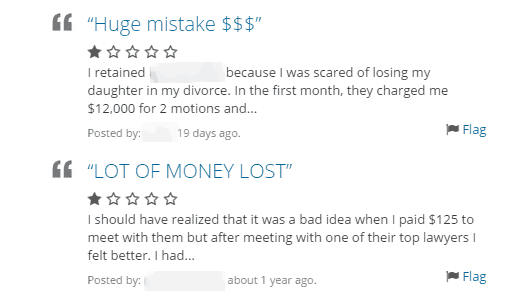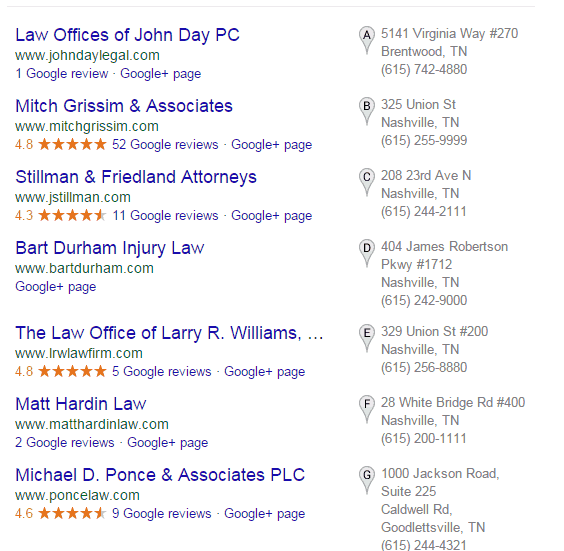There's an attorney here in Chicago who spends money on television advertising.
However, when you search on this attorney's name in Google, you get the above review summary from the firm's Google My Business page.
That same search also turns up other review sites that contain reviews like:

Some lawyers might not find this surprising. After all, it's an adversarial process. If you're not making someone unhappy, you're probably not doing it right.
However, these appear to be reviews from clients.
Of course, I can't tell (and neither can the public) whether these are real, let alone, warranted.
Nonetheless, when people see this attorney's expensive television ad, pull out their smartphone and search this attorney's name, they're going to see a whole bunch of relatively detailed negative reviews.
Further, at least on Google, the firm is completely silent. They haven't responded to a single review.
Deciding whether and how to respond to negative online reviews can be tricky. But it's difficult to argue that reviews don't play some role in influencing a prospective client's impression.
A lot of lawyers spend a lot of time and money trying to get attention from potential clients. This is particularly true in the context of lawyer SEO. In other words, many lawyers spend a lot of time and money trying to rank #1 in Google.
Unfortunately, lawyers often fail to consider what people actually see when they search.

Notice that the firm with the best local pack position has 1 Google review while the firms in the #2 and #3 spots have 52 and 11 reviews, respectively.
Which firms do you think command the most attention in this SERP?
If your search competitors have found a way to earn online reviews and you rely on search for new business, you really need to make earning online reviews a priority.
In fact, you should probably spend more effort on earning positive reviews than on trying to rank in these SERPs.
If negative online reviews, or absent reviews in a competitive search result, cause someone who found you through advertising, to remove you from their consideration set, those reviews are hurting your return on ad spend (ROAS).
I can't tell you how many times I hear lawyers say, "I rank number one but I'm not getting any calls."
While there are many factors that can contribute to this situation, many times, high search visibility with low inquiry rates can be attributed to a poor or non-existent online reputation.
You simply can't control the fact that, in the digital age, more and more legal services consumers expect to be able to find information about you online.
One of things that they expect to find is what your clients have to say about you.
Therefore, it just makes sense to get your web presence right before you spend a lot of money driving potential clients with large advertising spends.
This Thursday, Allison Shields and I will be discussing issues related to online reputation management at the ABA Techshow. If you're attending, we hope you stop by. Feel free to bring your questions.

Here's a recent Google SERP for "𝘄𝗵𝗼 𝗮𝗿𝗲 𝘁𝗵𝗲 𝗯𝗲𝘀𝘁 𝗰𝗮𝗿 𝗮𝗰𝗰𝗶𝗱𝗲𝗻𝘁 𝗹𝗮𝘄𝘆𝗲𝗿𝘀 𝗶𝗻 𝗽𝗵𝗶𝗹𝗮𝗱𝗲𝗹𝗽𝗵𝗶𝗮." Ads? ❌LSAs? ❌Local Pack? ❌Links? ❌ 🔷 AI Overview? ✅ 6 firms listed. Only one tiny 🔗. Click the 𝗦𝗵𝗼𝘄 𝗺𝗼𝗿𝗲 button? 𝗬𝗼𝘂 𝗴𝗲𝘁: Here's a more detailed look at some of these firms: THE PEARCE LAW FIRM, P.C.Edith Pearce, […]
On April 22, 2025, Google sent an email updating Local Services Ads Additional Terms for Providers: Subject: Action required: important updates to Local Service Ads Additional Terms Many people are arguing that lawyers cannot participate in Local Services Ads, as this would constitute a per se violation of the Rules of Professional Conduct related to […]
Conrad and I recently joined Zack at Lawyerist to record a conversation about AI and marketing. You might think that we spend the whole time on how lawyers can use AI to publish content. You'd be wrong. While AI can certainly support publishing, there are many more interesting ways to use it in legal marketing. […]
As more legal services consumers turn to ChatGPT for local law firm recommendations, a fascinating intersection between AI, search, and maps unfolds. While Google remains the undisputed leader in local business data, ChatGPT is increasingly becoming an entry point for searchers seeking legal representation. But here’s the kicker: instead of keeping users within its ecosystem, […]
When law firms contact us, they usually want to talk: • PPC Ads • SEO Rankings • Lead Generation Very few want to talk: • Brand • Trust & Recognition • Emotional Connection Admittedly, much of this concerns that AttorneySync is known for lead generation across those common digital channels. But even when we start […]
According to an October 2024 study by SE Ranking: "The legal niche triggers the highest percentage of AIOs (77.67%). The average number of links matched between the AI Overview resources and the top 20 search results was 6.49 for legal topics. AI Overviews for legal topics most frequently link to NYCourts.gov (114 links), YouTube.com (48 […]
I'm grateful for my friend, Charley Mann of Law firm Alchemy. If you're a lawyer, subscribe to his Free Email List. In a recent email, Charley calls out bad guru advice on hiring: "Trying to execute a major SEO improvement? You need to find people who will help you, instead of trying to DIY it […]
If you’ve spent any time on LinkedIn, you’ve likely seen posts from law firm SEO experts showing off charts with an “up and to the right” trajectory. These screenshots, often pulled from tools like Semrush or Ahrefs, are meant to signal SEO success. And it’s not just the agencies celebrating—𝗹𝗮𝘄 𝗳𝗶𝗿𝗺𝘀 𝘁𝗵𝗮𝘁 𝗵𝗮𝘃𝗲 𝗵𝗶𝗿𝗲𝗱 𝘁𝗵𝗲𝗺 […]
Meh, links! All things being equal, links still tend to move the dial more than any other factor in legal SERPs. Maybe links are having a diminishing impact internet-wide. But in my experience, quality links, especially relevant links (both topically and geographically), tend to improve law firm visibility in search more than most everything else. […]